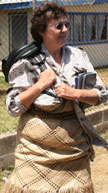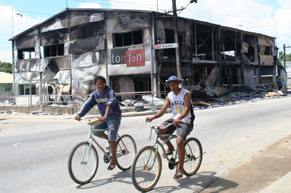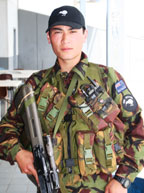|
Trouble in Tonga by Llewellyn and Susan Toulmin
"Why are you locking the shop doors?" I asked the nervous-looking young woman at the Friends Internet Café on the main street in Nuku’alofa, the capital of the Kingdom of Tonga. "Politics," she said. My wife Susan and I looked out at crowd streaming by, heading downtown. Some young men were carrying cans of gasoline. Then we spotted an overturned, burning car, and a looted liquor store. "Time to boogie," I said, and we headed for a quiet side street and grabbed a cab. "The Black Pearl Suites, quick," Susan told the cabbie, and we took off for the ‘burbs. Behind us, a huge column of smoke began to rise.
Our cabbie filled us in on the situation. Tonga, normally one of the quietest countries in the South Pacific, was trying to change from a feudal monarchy to a modern democracy. The king traditionally appointed 70 percent of the members of the parliament, and owned the electric monopoly, water company, telephone monopoly, national airline, national brewery, several major hotels, the clam farms, much of the land, and many of the duty-free liquor stores through his large Shoreline Group holding company. The Chinese and Indian merchants controlled most of the rest of the economy. The merchants’ grip had been strengthened when the king had sold them Tongan passports for $25,000 each. But the old king had recently died, and the new, less-loved king was trying to hold on to power. The opposition forces had held over thirty peaceful protests demanding reform, but the current Parliamentary session was about to expire without any real change. We had arrived by chance on the last day of the session, November 16, 2006, when the radicals decided to attack the Royal and foreign stores, and loot and burn them. Unfortunately for everyone involved, the normally quiet weather did not cooperate. High winds gusting to thirty miles per hour took the sparks from the burning royal- and foreign-owned stores, and spread them to all the other buildings in the ten blocks of downtown. Since almost all the buildings in the capital were made of wood, almost all of the capital – about 80 percent – went up in flames. And since Nuku’alofa was the only commercial center in the country, and the hub of the tiny economy, most of the economy was destroyed in one afternoon.
New Zealander Murray Hood was one of the workers trapped in the Shoreline building. He recounted, "I saw a truckload of young men breaking in the glass with rocks and coconuts. I hid upstairs, but was told that a fire had started. I clambered onto an upstairs air conditioning unit, helped by a Tongan company employee, who was bloody from the broken glass. Together we were able to escape down a ladder brought by the fire brigade. I lost my briefcase and passport in the blaze." Six looters, all Tongan men between 18 and 25, were killed in explosions in the Shoreline building. Two other looters were killed in other downtown buildings in similar circumstances. Police arrested about 50 looters and demonstrators, but were ineffectual at stopping the riot and fires. The mob attacked and burned the major hotel in town, the Royal Pacific (owned by the Shoreline Group), then the Tonfon (Tongan telephone) headquarters, and shops owned by Prime Minister Feleti Sevele. By nightfall the police and Tongan Defence Forces had re-established order and had cordoned off the downtown. Tom Rush, an American and owner of a small resort in the north of the Tongan archipelago, said, "It is clear that US and other Western tourists and interests were not targeted. Everything quieted down after the first night – I think the population was shocked at what had happened. While the downtown was largely destroyed, there were few attacks outside of the capital. In fact, in the outlying villages many Tongans stood guard in front of their local Chinese shops, just to make sure they were safe." The smoke from downtown filled the sky. The burnt orange sunset was beautiful. Arriving at the Black Pearl Suites, we were very happy to see no sign of rioters. The hotel was about two miles from downtown -- not a lot of protective distance. We looked back toward the center of town and saw a giant column of smoke spreading out in the high winds like a fan over our heads. The owner of the hotel told us not to worry. "I own two of the only guns on the island," he said, pointing to the Colt .45 in his waistband and the shotgun on the coffee table. "No rioters are going to face me down." He added, "And anyway, you see those fifteen big guys out front? Those are my cousins and nephews. Each one weighs at least 300 pounds, and they all carry cricket bats. We’re as safe as houses." We asked about the causes of the riot. "It’s the Royal Family," he said. "They own everything of value, and they won’t let go. That’s why the rioters are burning down the shops owned by the royals. A lot of people on the island think that the Royal Family owns this hotel, but in fact their name is not on the deed. So we are OK." Susan and I looked at each other. As it got dark, the electricity went out. Apparently the rioters had damaged the electric generating system. Luckily our candlelit dinner of fresh fish with remoulade sauce was terrific. We complimented the chef, who said, "Yes, we serve some of the best food on the island. That is why the Royal Palace is always asking us to cater their events." We were told that a US State Department representative would meet with stranded Americans in our hotel lounge. About ten of us gathered to hear her. We assumed that she had come to advise us. Wrong. She was there to tell her tale of woe. "I am usually stationed in Fiji," she complained, "where the political situation is even more tense than here. I’m here on vacation. Now I’m stuck in this mess." She had no information, no assistance from the regional US Embassy in Fiji, and no resources. She talked non-stop about herself. We quickly departed for the bar. Asking around, we learned that the Australian and New Zealand ambassadors were being very helpful to their stranded countrymen who had been burnt out. They were putting up families in the official ambassadorial residences, letting them sleep on sofas and on air mattresses, getting them food, water and information, and acting like one big family. An interesting contrast. That night Susan slept fully clothed, passport beneath her pillow, in case the hotel was attacked. She got only a few hours sleep, leaping up at every sound. At 3:00 am she arose to inspect the hotel’s defenses. She found the hotel owner lying on a chaise lounge on the balcony overlooking the road to downtown. He was wide awake. His pistol and shotgun were in his lap. "Go back to sleep, little lady," he said. "Everything’s going to be fine." The day after the riots things seemed quieter. Only a little smoke drifted downwind from the town. I met a reporter and a photographer from a New Zealand newspaper. We agreed to hire a van and drive around, to see if we could get some pictures of the destruction. This was a mistake.
But we wanted some pictures. So we darted around the corner and stopped about fifty yards from another checkpoint. We got some pictures of the checkpoint, when the police started gesticulating and yelling. We quickly headed back toward the van. The New Zealand photographer slipped behind a tree and dropped his expensive camera in a bush. I asked him what he was doing, and he said, "I’ve had my cameras confiscated and stolen by police in situations like this. So I hid my camera until the coast is clear." When it was evident that the police were not pursuing our van, he retrieved his camera and we drove to the burned telephone company headquarters on the outskirts of downtown. From the newsmen I learned more about the politics of Tonga. The previous King, Taufa’ahau Tupou IV, was famous for being the world’s heaviest (440 pounds) and most gullible monarch. He had hired a former Howard Hughes advisor as his official Court Jester. This worthy ran the King’s passport selling scheme. He raised $50 million selling Tongan passports, mostly to Hong Kong Chinese who feared the Communist takeover of their island. But then the money disappeared in a welter of false accounting statements and accusations. We got our photos and returned to the hotel. Then the waiting began. Susan and I were scheduled to fly out the next day. But all international flights were cancelled due to the riots, even though the airport was fine. The airlines refused to fly in until the airport was protected by non-Tongan forces. It took several days of negotiations for the Tongan government to give up its sovereign control of the only international airport in the country, and allow 150 Australian and New Zealand troops to come in and surround the airfield.
Two years later, after the commotion had died down, the new King, George Tupou V, held his coronation. He spent almost $3 million on the affair – about a third of the country’s aid budget – including $400,000 on ermine trimmed robes from Saville Row in London, $35,000 on a gold scepter similar to that of Queen Elizabeth II, and hundreds of thousands on three separate mammoth parties attended by movie stars. Not exactly a man of the people, King George V has been quoted as describing his Tongan subjects as "squatters who would urinate in elevators if there was nothing to stop them." Five years after the riots, the state of emergency imposed on the capital in 2006 is still in place. So, after this experience, would we visit Tonga again? Speaking for me (I think Susan would disagree), I would give a qualified "Yes." I would fly in to Nuku’alofa, skip the town and its rather flat boring island, and take an internal flight to beautiful, mountainous Vava’u, an hour to the north. I would snorkel, sail and go beachcombing, where I would be guaranteed lots of privacy and quiet in the true Friendly Islands.
* * *
Lew and Susan Toulmin live in Silver Spring. They are not planning any trips to Tonga in the immediate future. Close this window |


